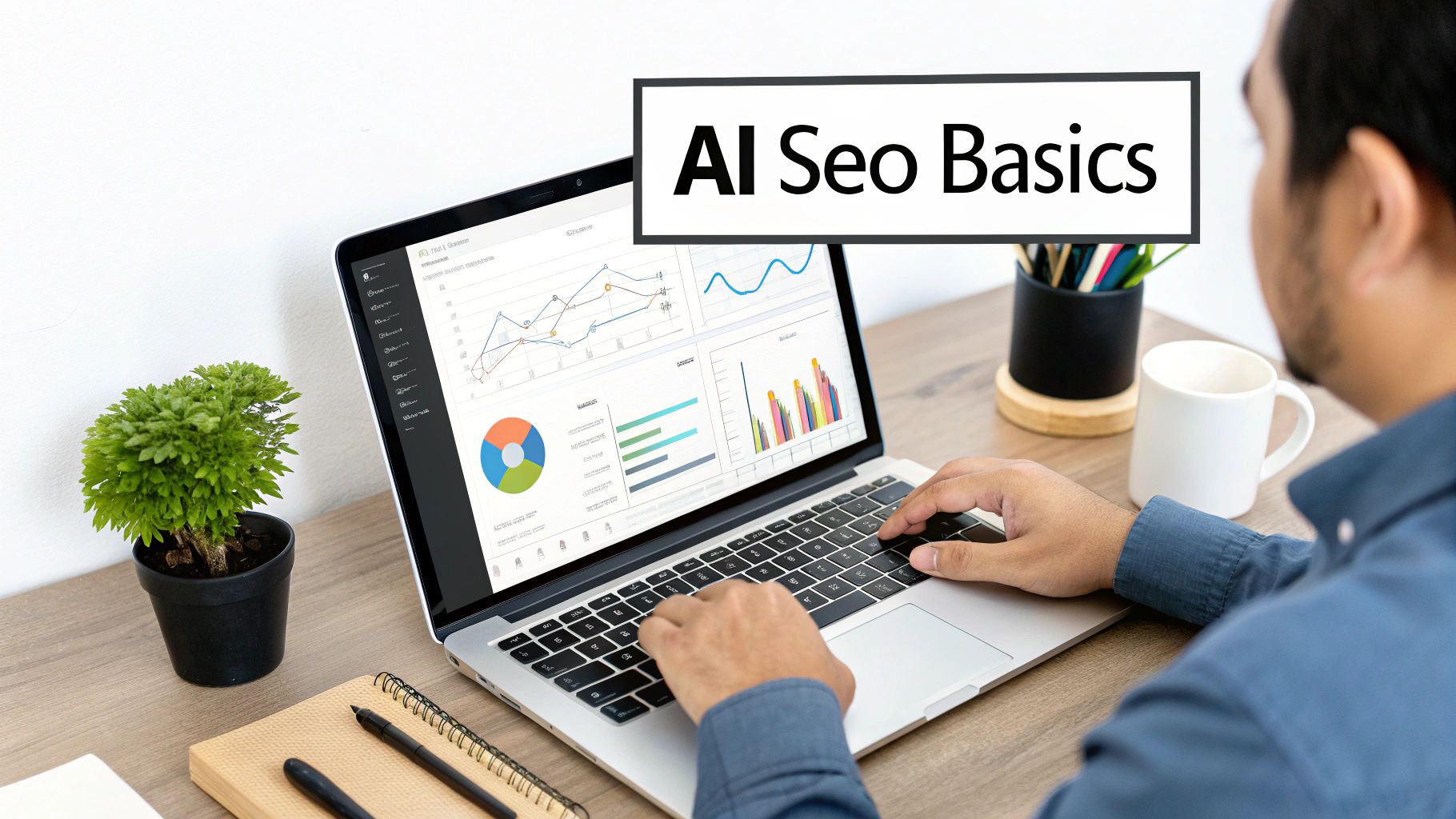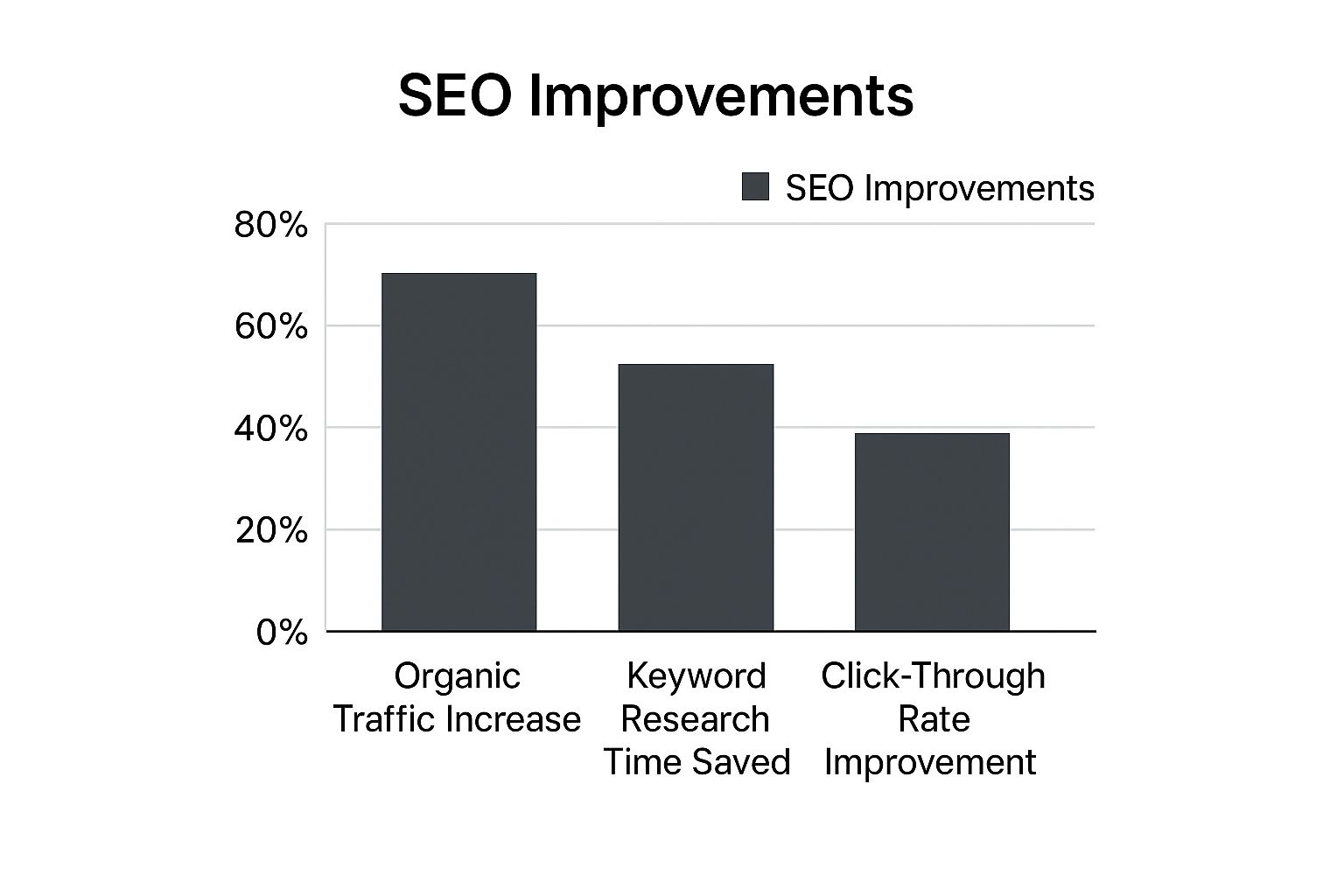AI Search Engine Optimization: Your Complete Strategy Guide
Understanding The AI Search Revolution
Remember keyword stuffing? It's a relic of a simpler SEO past. AI has changed how search engines work, shifting from basic keyword matching to sophisticated conversational systems. Imagine the difference between searching a library card catalog and asking a knowledgeable librarian. That's the leap we've made.
This shift requires a new approach to AI search engine optimization. Search engines now use AI to understand context, intent, and meaning-like a librarian anticipating your needs before you've fully expressed them. The screenshot below shows a Google search for "what is artificial intelligence."

Notice the detailed overview provided directly in the search results. This highlights the move toward providing immediate, comprehensive answers, which changes how users interact with search results and the type of content that ranks well. One of the most important changes in AI search engine optimization is the rise of these AI-generated responses. As of March 2026, Google's AI Overviews showed up in 13.14% of all search queries, a notable jump from 6.49% in January 2026. Discover more insights about AI Overviews here.
The Impact of AI on Search
This evolution means old-school SEO tactics can backfire. Instead of trying to game algorithms with keyword density, AI prioritizes genuine expertise and user value. Content quality, depth, and relevance are now key. Think of two articles about baking bread: a thin, keyword-stuffed piece versus a detailed guide with expert tips and user feedback. AI will likely favor the in-depth guide because it recognizes its value.
AI systems are constantly learning and adapting. This makes outdated optimization tricks, like excessive backlinking from low-quality sites, less effective. AI can tell the difference between real engagement and manufactured signals. This means building a strong online presence with valuable content is more critical than ever. How do you optimize for this new era of search? The next section will explore how to adapt your content strategy for AI-driven search engines.
How AI Changes Your Content Optimization Strategy
Imagine talking to the most knowledgeable person in your field. They can instantly verify everything you say against a vast library of information. That's what it's like creating content for AI, and it's changing the SEO game completely. Forget keyword stuffing and shady link-building tactics. Now, it's all about genuine value, deep expertise, and proving you know your stuff.
This means we need a fundamental shift in our thinking, from keyword density to topical authority. Instead of just peppering your text with a keyword, you need to showcase comprehensive knowledge. Think of it this way: would you trust a doctor who just throws around medical jargon, or one who patiently explains things with clear examples? AI, just like you, prefers the latter.

The infographic above shows how AI-driven SEO impacts key performance indicators. Notice the significant boost in organic traffic, the time saved on keyword research, and the improved click-through rates. These are the real, tangible benefits of optimizing for AI-powered search.
Structuring Content for AI Understanding
Let's say you're writing about "ai search engine optimization." Instead of scattering that phrase randomly, structure your content into logical sections with clear headings, like "Benefits of AI SEO" or "Tools for AI-Driven Content Optimization." This organized approach helps AI grasp the depth of your knowledge, establishing you as a credible source.
Think of it like a well-organized library: it's much easier to find a specific book. Similarly, structured content helps AI quickly extract key information and understand your expertise. Formatting elements like bullet points, lists, and tables make information more digestible for both AI and human readers. Check out Sellm.io's guide on Generative Search Optimization for a deeper dive.
To further illustrate the difference between traditional SEO and AI-optimized SEO, let's look at a comparison table. This table highlights how optimization strategies have evolved from a keyword-centric approach to one that prioritizes AI understanding.
Traditional SEO vs AI-Optimized SEO Comparison
| Aspect | Traditional SEO | AI-Optimized SEO | Impact |
|---|---|---|---|
| Content Focus | Keyword Density | Topical Authority | Increased relevance and user engagement |
| Structure | Basic keyword placement | Structured content with clear headings and formatting | Improved AI comprehension and content discoverability |
| Writing Style | Often formulaic and keyword-focused | Clear, concise, engaging, and informative | Better user experience and higher AI ranking potential |
| Link Building | Quantity over quality | Quality backlinks from reputable sources | Enhanced trust and authority for both AI and users |
The shift towards AI-optimized SEO, as shown in the table, focuses on creating valuable, well-structured content that caters to both AI and human readers. This approach leads to improved search visibility, better user experience, and increased overall website performance.
Writing for AI and Humans
Write in a clear, concise, and engaging style that resonates with both AI and human readers. Use analogies and real-world examples to explain complex concepts. This not only makes your content more appealing to humans but also helps AI understand the nuances of your arguments.
This shift to AI-driven SEO is having a real impact on businesses. 65% of businesses report better SEO results after incorporating AI tools into their strategies. What's more, 67% see improvements in content quality when using AI. Learn more about the impact of AI on SEO. By focusing on topical authority, structured content, and clear writing, you're setting yourself up as a trusted expert in the age of AI-powered search.
Mastering AI Overviews and Featured Snippets
Getting featured in AI Overviews is like holding the golden ticket. It's a sign you've reached the peak of online authority. But how do you grab this digital prize? By studying what works and learning from SEO pros, we can decode the secrets to capturing AI's attention. It's not just about the content itself, but the way you present it.

This screenshot shows how Google displays featured snippets, including rich results and AI-generated responses. See how these prominent results dominate the search results page, instantly drawing the user's eye. These visually rich answers often give users all the information they need without even clicking a link.
Identifying AI Overview Opportunities
First, understand what your audience wants to know but can't find. What's missing from the current search results? Let's say you're an AI SEO specialist. Look for niche areas within AI SEO where current content falls short. This means identifying those long-tail keywords and conversational questions that aren't being fully addressed.
Also, look at the types of content that consistently do well in AI Overviews. Do certain formats, like lists, tables, or step-by-step guides, seem to get featured more often? AI tends to like content that's easy to digest and structured logically. This helps the AI extract key points and present them to the user. For more insights, check out Sellm.io's thoughts on AI search optimization.
The way we think about search visibility is changing because of these AI-driven features. Featured snippets have an impressive 42.9% click-through rate (CTR), the highest of any search result. This is because AI-powered answers usually show up at the top of the page, getting the most attention. Learn more about SEO statistics. This really highlights the importance of optimizing your content for these top spots.
Crafting AI-Friendly Content
Think about why some answer formats work better than others. AI, just like people, prefers clear, concise answers that get to the point. Avoid long, meandering paragraphs. Instead, break complex information into smaller, digestible pieces. Use bullet points, numbered lists, and bold text to emphasize key takeaways.
Imagine someone asks, "What is AI search engine optimization?" Would you answer with a dense paragraph or a short definition followed by a bulleted list of key benefits? AI systems are more likely to choose the second approach because it's easier to access the information. Analogies and real-world examples can also make tricky concepts clearer, making your content appealing to both AI and human readers.
Auditing Your Content
Look through your current content for AI Overview opportunities. Are there pages you could tweak to better answer specific user questions? Maybe you have a blog post that touches on a topic but doesn't go into enough detail for a featured snippet. By finding these areas for improvement, you can revise your content strategically to match AI's preferences.
This might involve adding more to existing sections, including new examples, or restructuring content for clarity. A systematic audit process will help you evaluate your content and prioritize your optimization efforts. Consider developing templates specifically for crafting AI-friendly answers. These templates could include best practices for formatting, structure, and content depth, creating a consistent approach to AI SEO.
To help you get started, we've put together a checklist of essential elements for optimizing your content for AI-powered search results.
AI Overview Optimization Checklist: Essential elements and best practices for content that gets featured in AI-powered search results
| Element | Optimization Technique | Success Rate | Implementation Difficulty |
|---|---|---|---|
| Clear & Concise Language | Use short sentences, avoid jargon | High | Easy |
| Structured Content | Use headings, lists, and tables | High | Easy |
| Relevant Keywords | Include long-tail keywords | Medium | Medium |
| Depth of Information | Provide comprehensive answers | Medium | Medium |
| Examples & Analogies | Use real-world examples | Medium | Medium |
This checklist provides a quick overview of the key elements you should focus on when optimizing your content. By focusing on these core areas, you'll significantly improve your chances of being featured in AI Overviews and featured snippets.
Technical Implementation With AI Tools
The right AI tools can transform your SEO workflow from a guessing game into a precise strategy. But their effectiveness depends on knowing how to use them. Let's cut through the hype and focus on practical strategies that get real results. We'll explore how SEO professionals effectively use AI-powered platforms while keeping the human touch that makes content connect.
Integrating AI Into Your Workflow
Think of AI tools like helpful assistants, not replacements for your insights. They can help uncover hidden keywords, analyze content gaps, and spotlight topics where your expertise shines.
For example, imagine researching "ai search engine optimization." An AI tool can quickly find related long-tail keywords like "best AI tools for content optimization" or "AI-driven SEO strategy for eCommerce." This reveals specific areas you can target.
AI can also analyze your competitors' content, showing their strengths and weaknesses. This competitive intelligence helps you identify areas within your niche that aren't being fully addressed, giving you an edge. Platforms like Sellm.io become invaluable here. Sellm.io focuses on GEO and brand monitoring in AI environments, optimizing visibility in responses from Large Language Models (LLMs) like ChatGPT, Claude, and Perplexity.

This Sellm.io screenshot shows how the platform tracks your brand's visibility within AI-powered search responses. The interface provides clear metrics on your brand's presence and performance, offering practical insights to improve your AI SEO strategy. By monitoring these insights, you can understand how LLMs see your brand and adjust your content accordingly.
Using AI for Technical SEO
Beyond content, AI can also reshape your technical SEO. AI-powered tools can perform complete technical audits, finding problems like broken links, slow page speed, and mobile-friendliness issues much faster than manual checks. It's like having an army of virtual robots crawling your site, finding any technical flaw that could be affecting your ranking.
But just finding issues isn't enough. AI tools also provide specific recommendations for fixing these problems, offering steps to improve your site's technical health. This frees you from tedious technical work, letting you focus on strategic optimization.
For instance, an AI tool might suggest optimizing image sizes for faster page load speed or recommend fixing broken internal links to improve navigation. AI also helps you stay ahead of the curve as search engine algorithms change. AI tools can track these changes, ensuring your technical SEO is always current. This lets you proactively adapt to new algorithm updates and maintain a solid online presence.
Maintaining Editorial Control With AI
A common concern about using AI in SEO is losing the human element. While AI offers valuable suggestions, it's vital to maintain editorial control. Think of AI as a powerful research assistant that provides data and insights. The final content decisions, however, remain yours. This is where your creativity and expertise become essential, ensuring your content is authentic and engaging.
This means carefully reviewing AI-generated content optimization suggestions. Make sure they match your brand's voice and messaging. Don't simply accept every suggestion; use your judgment to decide which changes truly improve your content. Balancing AI-driven insights with human editorial control is the key to creating content that resonates with both search engines and your audience.
For example, if an AI tool suggests changing a phrase, consider whether the change improves clarity or makes the content sound robotic. This careful approach keeps your content engaging and human, even when using AI insights. This lets you scale your efforts without sacrificing quality or authenticity.
Building Authority and Trust For AI Systems
In the world of AI-powered search, authority isn't just about backlinks anymore. It's like being an expert witness – you need credentials that AI can verify. This section explores how to build that credibility, focusing on E-E-A-T: Experience, Expertise, Authoritativeness, and Trustworthiness. These are essential for visibility in AI search results.
Demonstrating Expertise Beyond the Surface
Imagine two chefs: one boasts online, the other consistently wins awards and shares real culinary knowledge. AI, like a discerning diner, will favor the chef with proven experience. Building authority for AI means going beyond surface-level content and showing real depth.
For example, if you write about "ai search engine optimization," don't just list keywords. Explain how AI evaluates content, share successful case studies, and offer actionable insights from real work. This shows AI you're a credible source.
Building Credibility Through Relationships
Think of academic citations: the more a work is cited, the more authority it gains. Similarly, in AI SEO, genuine citations and mentions signal credibility. This means focusing on building genuine relationships in your industry.
Engage with other experts, contribute to discussions, and create content others find valuable. Guest posting on reputable blogs (SEMrush) or participating in relevant online communities can boost your authority in the eyes of AI.
Consistency: The Key to AI Trust
Building trust with AI is like building any reputation: it takes consistent effort and quality. Think of a reliable news source. Their accuracy builds trust over time. Similarly, consistently creating quality content reinforces your expertise and builds trust signals that AI values.
This isn't about churning out content, but consistently delivering insightful, valuable pieces. This consistency solidifies your reputation as a reliable source in the AI ecosystem.
Maintaining Authority in a Changing Landscape
AI search is constantly evolving. Think of a surfer navigating changing waves. They constantly adjust to maintain balance. Staying informed about AI search algorithm changes and adapting your strategies is crucial for maintaining authority.
Continuously learn about new AI SEO tools, like Sellm.io, and understand how AI interprets content. By staying informed and flexible, your content will resonate with AI systems and human readers alike. This adaptability helps you maintain your authority even as the technology changes.
Measuring Success In AI-Driven Search
Let's talk about measuring success with SEO in this new world of AI. It's a different game now. Traditional SEO was all about rankings – like getting your book on the highest shelf in the library. Important, sure, but what if no one actually *reads* it?
Now, imagine the librarian starts recommending specific books to visitors. Suddenly, that personal touch, that *recommendation*, becomes incredibly powerful. That's what AI is doing with search. It's curating answers, featuring certain content, and that changes how we measure success.
Beyond Traditional Metrics
In the old days, clicks were king. But AI often gives answers right there in the search results, leading to more zero-click searches. Doesn't mean you're losing out. Think of it as free advertising. Your name is right there, front and center, building brand recognition even without a click. It's like having a billboard on the busiest street in town. You're constantly in view. You might be interested in: our guide on AI SEO.
Also, we need to pay attention to AI Overviews, featured snippets, and other ways AI highlights content. These are like the librarian's top recommendations. Getting featured here is like gold.
New KPIs for AI SEO
So, how do we measure all this? We need to balance traditional SEO metrics with new Key Performance Indicators (KPIs) specifically for AI. Here are a few to consider:
- Appearance in AI Overviews: How often is your content the star of the show?
- Featured Snippet Acquisition: Are you snagging those prime spots at the top of the results?
- Brand Mentions in AI Responses: Is AI recognizing your brand as a trusted source?
- Zero-Click Optimization: How often are you showing up, even without direct clicks?
These metrics give us a much more complete picture of how we're doing in AI-driven search. It's not just about being *seen*, but about building trust and authority with the AI itself.
Tools and Techniques for Monitoring
The good news is that tools are emerging to help track these new KPIs. Platforms like Sellm.io are designed to monitor brand visibility in AI environments. They provide data on how often your brand shows up in responses from Large Language Models (LLMs) like ChatGPT, Claude, and Perplexity. This helps you understand how AI perceives your brand and how you stack up against the competition.
But data is just the beginning. The real power comes from *interpreting* that data. Ask yourself:
- Which keywords are triggering AI Overviews featuring my content?
- What kind of content consistently performs well in zero-click responses?
- Are there patterns where my competitors are outperforming me?
These insights can help you refine your content strategy, keyword targeting, and overall SEO approach. It's about understanding not just *what's* happening, but *why*.
Reporting AI SEO Success
Finally, how do we explain all this to stakeholders who are used to traditional SEO reports? We need to translate AI SEO performance into something they understand. For example:
- Increased brand visibility in AI-powered search results
- Growth in organic traffic from featured snippets and AI Overviews
- Improved brand authority and trust based on AI mentions
Framing your results in the context of business goals helps everyone understand the value of AI SEO. It shows how these new strategies contribute to the bottom line, which is key to getting continued support for this rapidly evolving area of search. By effectively measuring and communicating AI SEO success, you position your organization for long-term growth in this exciting new search landscape.
Key Takeaways and Action Steps
This guide has walked us through the fascinating world of AI search engine optimization. Now, let's turn those insights into a practical plan you can start using right away. Whether you're just beginning your AI SEO journey or you're a seasoned expert, these steps will set you on the path to long-term success.
Auditing Your Content for AI
Think of this first step as decluttering your website's content. Go through your existing pages and pinpoint those that could use some AI-powered fine-tuning. Ask yourself these key questions:
- Does this content fully answer a user's question?
- Can the structure be improved for better AI understanding and readability?
- Is there room for more real-world examples, data, or expert opinions?
For example, if you have a blog post about "ai search engine optimization" that only briefly touches on practical applications, consider expanding that section with concrete examples using tools like Sellm.io. This deeper dive will be beneficial for both AI and human readers.
Practical Optimization Steps
Optimizing for AI is like building a house: it all starts with a solid foundation. Here are the essential building blocks:
- Structure: Just as a well-organized house makes it easy to find things, structured content helps AI understand your message. Use clear headings (H2s, H3s, etc.), bullet points, and tables.
- Clarity: Write in clear, concise sentences, avoiding technical jargon. Explain complex ideas with simple analogies. Imagine explaining AI to a friend who's not a tech expert-that's the level of clarity to aim for.
- Keywords: Focus on becoming a recognized authority on a topic, not just repeating keywords. Cover a subject thoroughly and provide valuable information instead of just stuffing keywords into your text.
These steps will make your content more accessible and engaging for both AI and human audiences.
Technical Implementation and Tools
AI tools can be powerful allies in your SEO efforts. Platforms like Sellm.io are like having an AI SEO assistant by your side. They can help you:
- Find new keyword opportunities you might have missed
- Identify content gaps in your niche
- Monitor how your brand appears in AI Overviews and featured snippets
Don't be afraid to try out different tools to discover what works best for your needs.
Measuring and Tracking Your Progress
Success in AI SEO requires a fresh perspective on metrics. Instead of only looking at clicks and rankings, track how often your brand shows up in AI Overviews, featured snippets, and within AI-generated responses. Ask yourself: Is your brand becoming the go-to source of information on your topic?
Tools like Sellm.io can give you insights into how LLMs (Large Language Models) perceive your brand. Regularly reviewing this data will help you adjust your strategy as needed. It's like checking your map on a road trip to make sure you're still heading in the right direction.
Start optimizing your content for AI today, and build a lasting presence in the ever-changing search landscape. Ready to tap into the power of AI for your SEO? Explore Sellm.io and transform your search strategy.
